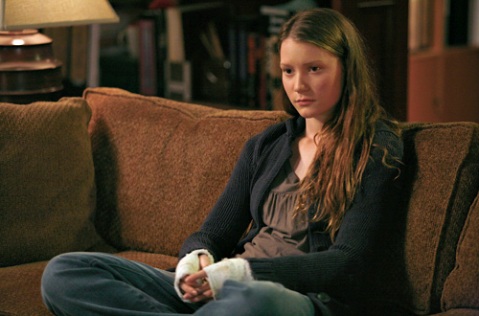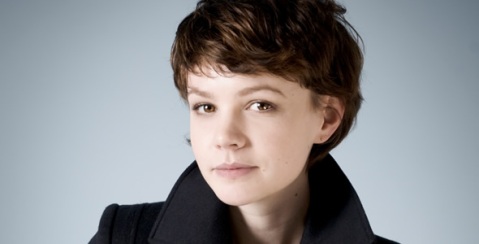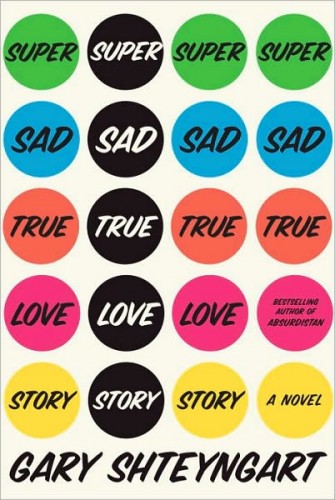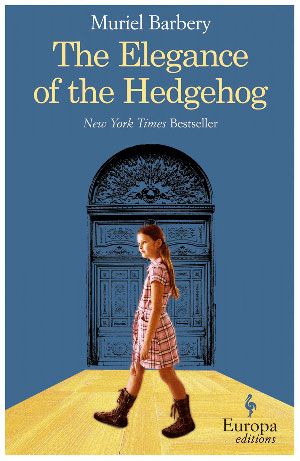Meryl Streep and “impersonation”
15 January 2012
So I woke up this morning to find it was 1° F outside. (That’s -17° C. Can we say “yikes!”?) Naturally, two things crossed my mind:
- (Sarcastically.) It’s really too bad the gym is closed and I’ll have to stay inside all day in my pyjamas.
- (Seriously.) Why is everyone calling Meryl Streep’s performance in The Iron Lady an “impersonation” of Margaret Thatcher?
- What a geek.
- Yeah, why “impersonation”? Please tell me, Feminéma!
- It’s just a little cold — put on a few layers and go for a walk already, wimp.
Blogger JustMeMike pointed it out in his review of the film, noting the term’s appearance in virtually every review (just google it and you’ll see). “How come no one referred to Leonardo DiCaprio ‘impersonating’ J. Edgar (Hoover) in the same way?” he asks. Exactly!
 Impersonation. It’s one of those terms that skirts between flattery (“an eerie job of inhabiting that real-life personage”) and a backhanded slam against such close attention to accent, appearance, and personal tics as less than true acting (“it’s only a parlor trick”).
Impersonation. It’s one of those terms that skirts between flattery (“an eerie job of inhabiting that real-life personage”) and a backhanded slam against such close attention to accent, appearance, and personal tics as less than true acting (“it’s only a parlor trick”).
It reminds me of the problem of the “uncanny valley” in modern 3D animation (I’m looking at you, Tintin) whereby audiences find themselves revulsed and disturbed when an animated character looks too realistic. Impersonators, after all, are the kinds of low-level entertainers who appear in Vegas or on Saturday Night Live. Impersonators emphasize exactitude rather than artistry. A great impersonation gets all the details right — but can’t go further to impress with real acting skill.
Let’s also remember that there are female impersonators — that category of campy performer who dresses as Liza Minnelli or Dolly Parton in order to get a lot of whoops from a drunken audience. These performers are not associated with manly acting talent.
As near as I can tell, those critics who are also good writers have used the term impersonation not to complain about Streep, but to contrast her strong performance with the utterly disappointing film. Roger Ebert writes, “Streep creates an uncanny impersonation of British Prime Minister Margaret Thatcher, but in this film she’s all dressed up with nowhere to go.” A. O. Scott likewise uses his flattery of Streep’s work as a rhetorical pivot to detail the film’s shortcomings. “Ms. Streep provides, once again, a technically flawless impersonation that also seems to reveal the inner essence of a well-known person,” he explains, before complaining about “the film’s vague and cursory treatment of her political career.” In other words, these writers seek to make it clear that Streep did what she could with a lame script.
Since then, however, critics who are less aware of their vocabulary’s connotations have jumped on the impersonation wagon to use it all the time in describing her role. “Meryl Streep’s performance as/ impersonation of Margaret Thatcher had Oscar written all over it,” writes Roger Moore. John O’Sullivan also admiringly notes that Streep’s “uncanny accuracy … goes beyond brilliant impersonation” in his piece for Radio Free Europe. These pieces blur the boundaries between impersonation and acting; yet my actor friends bristle at the notion that they are equivalent or that performing in the role of a real-life person demands impersonation. After all, numerous  flattering reviews of My Week With Marilyn state something to the effect of, “Michelle Williams doesn’t so much impersonate Marilyn Monroe as suggest her.” None of these statements seem overtly to associate impersonation with acting that leaves something out. I truly don’t think these writers use the term to complain about Streep (or Williams, right), at least not consciously.
flattering reviews of My Week With Marilyn state something to the effect of, “Michelle Williams doesn’t so much impersonate Marilyn Monroe as suggest her.” None of these statements seem overtly to associate impersonation with acting that leaves something out. I truly don’t think these writers use the term to complain about Streep (or Williams, right), at least not consciously.
But this returns us to JMM’s question: why don’t these writers use the term impersonation when they discuss Leonardo DiCaprio’s J. Edgar (or, for that matter, his Howard Hughes from The Aviator)? Why wasn’t Michael Fassbender “impersonating” Carl Jung in A Dangerous Method, or Colin Firth “impersonating” King George V in The King’s Speech, or Jesse Eisenberg “impersonating” Mark Zuckerberg in The Social Network?
Here I can only speculate, as I don’t know the inner souls of all these film critics, but I want to suggest that it can be attributed to an unconscious bias in favor of the superlative acting skills of male actors. An enormous percentage of published film critics in the US are male. Combine this with an industry seriously tilted toward male success and you have conditions within which even the most female-friendly critics are less inclined to celebrate an actress’s accomplishment without using terms with complex connotations. (Would a male critic really associate a male actor with the term impersonation so long as there are “female impersonators” out there?) This bias may be unconscious and not intended to express sexism, but we can see its effects nevertheless.
Until I started this blog and educated myself on the issues, I was unaware of the extent to which men dominate filmmaking and film criticism. It’s not just the fact that women appear onscreen less, behind the camera less, as producers less, as writers less — and that they get paid less overall. It’s also the more subtle things — the ways a woman’s subtle performance will get overlooked as male critics fall over themselves to praise her male co-star. The ways that female actors inhabit such a severely limited range of body types — I dare you to come up with the female equivalent of Philip Seymour Hoffman or Paul Giamatti, much less Cedric The Entertainer or Gérard Depardieu.
These critics may not be consciously demeaning Streep’s performance. But the term impersonation is not a wholly flattering description of what she does — if it were, we’d have seen it appear in reviews of men’s biopics.
Now, off for a walk while it’s still a balmy 11° F (-11.6° C).
Filed in 2000s films, 2010s films, Jesse Eisenberg, Meryl Streep, Michael Fassbender, The curious case of women in film, The woman problem in the media, Why feminism matters now
Tags: A Dangerous Method, A. O. Scott, Colin Firth, impersonation, J. Edgar, Jesse Eisenberg, Leonardo DiCaprio, Meryl Streep, Michael Fassbender, Michelle Williams, My Week With Marilyn, Roger Ebert, Saturday Night Live, The Adventures of Tintin, The Iron Lady, The King's Speech, The Social Network
The Brainy Bunch, girls edition
11 December 2010
Has anyone else noticed that articles like this one in New York Magazine don’t get written about young female actors? “The Brainy Bunch” is about five young men (Jesse Eisenberg, Michael Fassbender, James Franco, Joseph Gordon-Levitt, and Tom Hardy) who, according to the journalist, bust a bunch of stereotypes because they play twitchy, complicated, and most of all brilliant characters. The author marvels that these smart actors “bring the raw nerve of indie sensibility” to the screen; moreover, “in so doing, they are reimagining the mainstream.” Articles like this one are inevitably about men — not because actresses aren’t smart, but because they’re not playing smart onscreen. This has lathered me up into a rant because I think this is yet another example of the exceptionally disturbing moment we’re living in, during which women’s primary value is their hotness, not their smartness. Considering that I grew up in an age when the tomboy/ smartypants Jodie Foster was the pre-teen It Girl — a multilingual woman who graduated magna cum laude from Yale — I’m not prepared to let men be smart while women commit their energies to being hot.

Yet I’ve been putting some muscle into coming up with a similar list of remarkable young female actors who play smart onscreen and it’s really hard. Not hard for older women, mind you; as a culture we seem perfectly willing to grant brains to women over 35 (witness Helen Mirren, Holly Hunter, Tilda Swinton, Charlotte Rampling, Frances McDormand, Judy Davis …). The one vivid exeption to the rule is Mia Wasikowska (above), she of that remarkable 1st season of In Treatment, Alice in Wonderland, as the teenaged daughter in The Kids are All Right, and the upcoming Jane Eyre. Other than that? Can you think of a single young actor who plays smart onscreen from one role to the next?

I can’t. As much as I loved the fast-talking smarts of Carey Mulligan in An Education and Emma Stone in Easy A this year, there’s one thing that ruins those tales for me: ultimately these smart characters are shown to be dumb when it comes to men and sex (respectively). Get it? Smart girls aren’t smart about everything. I can think of a couple of one-off performances this year — Jennifer Lawrence in Winter’s Bone and Noomi Rapace in the Girl With the Dragon Tattoo franchise, but I have yet to be convinced that these actors can translate one excellent part into the kinds of careers that New York Magazine‘s favorite young men have achieved. Consider the career of Harvard grad Natalie Portman, who’s now getting close to 30 (and therefore into the age range wherein Hollywood allows women to be brilliant) — has she ever played smart onscreen? And don’t even get me started on the fact that the last time I saw a smart young Latina, Asian, Native American, or black woman onscreen was Shareeka Epps in Half Nelson (2006) — and where have the roles gone for Epps in the meantime?

If any of you doubts the perversity of this trend, consider one of the prevailing cultural anxieties appearing in major media of the past six months: the idea that boys are falling behind girls (or, in Hanna Rosin’s trademark hysterical terms, THE END OF MEN). At the same time that we watch smart boys and hot girls onscreen, we’re also supposed to feel anxious about the fact that girls do better in school and young women are going to college in vastly larger numbers than boys (they make up roughly 60% of college populations). This has prompted Rosin and her ilk to proclaim that women are “winning” some kind of battle against men. Thus, the fact that our films persist in peddling some kind of retro fantasy about boys’ smartness seems to reject our anxieties that girls might be pretty and smart, and reassures us that smart dudes will always bag the hotties.

If you need an explanation for my bleak mood, it’s because I just finished reading Gary Shteyngart’s incredibly disturbing dystopian novel, Super Sad True Love Story. In this America of the future, women wear clothes made by the JuicyPussy brand, Total Surrender panties (which pop off at the push of a little button), and have their hotness level perpetually broadcast to everyone around them via a version of a smartphone called an äpparät. It’s a brilliant characterization of the future (I cringed and laughed at the fact that the hero’s love interest, Eunice Park, majored in Images and minored in Assertiveness in college — we all know that’s where we’re heading) but ultimately one that reiterates that tired trope: shlubby, bookish, imperfect, aging hero falls for very beautiful, very young, very anti-intellectual woman — and wins her, at least for a while. You know what? I love shlubby men in real life (hi, honey!), but I have grown to despise their perpetual appearance in narratives.
So to cleanse my palate of the oily aftertaste of Super Sad, I’ve plunged myself into Muriel Barbery’s wonderful novel, The Elegance of the Hedgehog, which moves back and forth between the interior monologues of two brilliant women: the autodidact Renée, who hides behind her mask as an unkempt, sullen concierge in an elegant Paris apartment building; and Paloma, the precociously intelligent 12-year-old who lives upstairs and despises the pretentions of her family, teachers, and classmates. They seem to be on a path to discover one another — but I’m at the point in the novel when I’m so enjoying just listening to them think out loud that I’m not sure I care whether the narrative goes anywhere (Paloma has a diatribe about why grammar is about accessing the beauty of language that’s so wonderful I’m thinking of plagiarizing it for use in my classes).
I’ve plunged myself into Muriel Barbery’s wonderful novel, The Elegance of the Hedgehog, which moves back and forth between the interior monologues of two brilliant women: the autodidact Renée, who hides behind her mask as an unkempt, sullen concierge in an elegant Paris apartment building; and Paloma, the precociously intelligent 12-year-old who lives upstairs and despises the pretentions of her family, teachers, and classmates. They seem to be on a path to discover one another — but I’m at the point in the novel when I’m so enjoying just listening to them think out loud that I’m not sure I care whether the narrative goes anywhere (Paloma has a diatribe about why grammar is about accessing the beauty of language that’s so wonderful I’m thinking of plagiarizing it for use in my classes).
Here’s what it would take to cultivate a generation of young actresses known for their braininess:
- Just jettison the smart vs. hot binary for women onscreen already. If I see glasses used as the “smart” signifier one more time…
- Write some stories in which young women aren’t just interested in dudes all the time, but have wholly stand-alone loves of language, art, math, con artistry, biology, music, sports, comic books, religion, killing demons, other girls, or food — even drugs or booze, for gods’ sake — just like actual women.
- Stop resigning smart girls to the sidekick position in kids’ films like Harry Potter, Cloudy With a Chance of Meatballs, and TV shows like Buffy, etc.
- Show that smartness isn’t just a magical quality endowed by nature, but is something that takes work.
- Show that smartness can pose a problem beyond scaring off potential dudes — when young women face idiotic, paternalistic bosses, teachers too tired to teach to the top 1% of a class, or families in which no one has ever gone to college.
- Let girls play brilliant anti-heroes along the lines of Jesse Eisenberg’s take on Mark Zuckerberg — or, hell, just weird antisocial types like Lisbeth Salander.
- Let girls play funny.
- Let young female actors fail occasionally in a part the way we just keep forgiving failures by Jonah Hill, Zach Galifianakis, Ashton Kutcher, even Robert Downey, Jr. — the list goes on — without career consequences.
- Give me a central female character besides The Girl With the Dragon Tattoo who’s a computer whiz.
- Display explicitly feminist characters onscreen, and have them explain their opinions.
Maybe then we won’t experience that odd whiplash of suddenly having our actresses arrive at the age of 35 and suddenly become smart (does this read as unattractive and/or ball-busting to male viewers, I wonder?). I, for one, am looking forward to my movies looking a bit more like reality.
Filed in 2000s films, 2010s films, An Education, Carey Mulligan, Easy A, Emma Stone, female ambition, Gary Shteyngart, gender gap, Girl Who Kicked the Hornet's Nest, Girl Who Played with Fire, Girl with the Dragon Tattoo, Half Nelson, Hanna Rosin, Helen Mirren, Holly Hunter, Jennifer Lawrence, Jesse Eisenberg, Jodie Foster, Mia Wasikowska, Movies & books you need to know (and probably don't), Muriel Barbery, Natalie Portman, Noomi Rapace, Shareeka Epps, The curious case of women in film, Tilda Swinton, Why feminism matters now, Winter's Bone
Tags: An Education, Carey Mulligan, Easy A, Emma Stone, Gary Shteyngart, Girl with the Dragon Tattoo, In Treatment, Jennifer Lawrence, Jodie Foster, Mia Wasikowska, Muriel Barbery, Natalie Portman, Noomi Rapace, Shareeka Epps, Super Sad True Love Story, The Elegance of the Hedgehog, Winter's Bone
“The Social Network” (2010): a love story between men
10 October 2010
Here’s what I’ll take for granted for the rest of this piece: this is a tight, fascinating film about a Citizen Kane-type character capable of extraordinary brilliance, caustic wit, and whiplash-inducing revenge. As anti-heroes go, Jesse Eisenberg’s rendition of Mark Zuckerberg ranks up at the very top with Matt Damon’s Tom Ripley, Al Pacino’s Michael Corleone, and Helen Mirren’s Queen Elizabeth II. You’d have to be living under a rock not to have heard already that the writing is vintage-crisp Aaron Sorkin, the directing is vintage-creepy David Fincher, and (less discussed) the editing by Kirk Baxter and Angus Wall makes it feel like an action movie rather than what might otherwise have been a ponderous, “Rashomon”-like multiple-viewpoint meditation. It’s great — a really good movie. But I want to talk about its depictions of manliness and women, which are alternately profound and utterly tossed off. Guess who gets tossed off? To cut to the chase: I think it’s more useful to think about this as a love story between men.

In his interview last week with Aaron Sorkin Stephen Colbert commended him on the opening scene, in which Zuckerberg (Eisenberg) and Erica (Rooney Mara), who is breaking up with him, have a conversation that’s more like a boxing match than a typical film conversation: they’re two exceptionally sharp and flinty characters, and she can’t stand him anymore. Yet, as Colbert noted with the kind of forthrightness we wish we’d see elsewhere, “The other ladies in the movie don’t have as much to say because they’re high or drunk or [bleep]ing guys in the bathroom. Why are there no other women of any substance in the movie?” In response, Sorkin hawed for a moment, then copped to it: “The other women are prizes.”

Colbert and Sorkin weren’t joking. As much as this breakup matters to the story, women in general are utterly objectified by these Harvard men, primarily serving to propel the story forward only when they prove to be crazy, underage, or appearing briefly to utter something true, as Rashida Jones’ character does near the end. (Sidebar: I maintain that last is more an example of the Magical Negro trope [as Spike Lee and Dave Chappelle have most brilliantly laid it out]; it’s no accident that Jones’ character is not just sexually unavailable to Zuckerberg but, famously, mixed-race: her real-life father is Quincy Jones.) To be clear, none of the objectification of women is criticized by the film; the fact that beautiful women throw themselves in the way of powerful men is portrayed as one of the natural by-products of a man’s arrival to popularity or status. The way the film treats women of Asian descent is especially abhorrent, using the cheapest stereotypes in the book. Women are forgettable, throwaway prizes, like a ribbon or a certificate or a trophy-ette one puts on a shelf. Granted, these are prizes one can [bleep] in the bathroom; the point is, what matters is the competition between men to get those prizes.
 And that’s what I love about Fincher’s movies: as much as he often finesses his female characters, he’s brilliant when it comes to subtly tracing the alternately loving, eerie, homoerotic, or twisted aspects of men’s relationships with one another. I still think Fincher’s “Fight Club” (1999) remains one of the best analyses of 20th-century manhood we’ve got. Okay, an easy criticism here would be, “Great — yet another elaboration of manhood. We sure didn’t have enough of those.” Don’t worry: I’ll advance that criticism of a lot of those other films, but not this one. As much as I throw up my hands at its treatment of women, “The Social Network” is punctuated with moments that reveal Zuckerberg’s complex relationships with men, relationships that could appear in Eve Sedgwick’s formative, brilliant academic work, Between Men: English Literature and Male Homosocial Desire, published back in the early 90s. Men’s relationships with each other are perhaps of primary importance, Sedgwick suggested, as it is there that men find their most likely access to both financial reward and prestige — but also to fraternal bonds that may matter just as much as material advancement. For part of the film, the main affective relationship is between Zuckerberg and his wealthy best friend from Harvard, Eduardo Saverin (Andrew Garfield); yet when Zuckerberg meets the power-prettyboy-Napster founder Sean Parker (Justin Timberlake, in a terrific casting decision), he falls just a little bit in love, and the chips fall from there. Tenured Radical calls Parker Zuckerberg’s “soul mate,” an utterly accurate depiction.
And that’s what I love about Fincher’s movies: as much as he often finesses his female characters, he’s brilliant when it comes to subtly tracing the alternately loving, eerie, homoerotic, or twisted aspects of men’s relationships with one another. I still think Fincher’s “Fight Club” (1999) remains one of the best analyses of 20th-century manhood we’ve got. Okay, an easy criticism here would be, “Great — yet another elaboration of manhood. We sure didn’t have enough of those.” Don’t worry: I’ll advance that criticism of a lot of those other films, but not this one. As much as I throw up my hands at its treatment of women, “The Social Network” is punctuated with moments that reveal Zuckerberg’s complex relationships with men, relationships that could appear in Eve Sedgwick’s formative, brilliant academic work, Between Men: English Literature and Male Homosocial Desire, published back in the early 90s. Men’s relationships with each other are perhaps of primary importance, Sedgwick suggested, as it is there that men find their most likely access to both financial reward and prestige — but also to fraternal bonds that may matter just as much as material advancement. For part of the film, the main affective relationship is between Zuckerberg and his wealthy best friend from Harvard, Eduardo Saverin (Andrew Garfield); yet when Zuckerberg meets the power-prettyboy-Napster founder Sean Parker (Justin Timberlake, in a terrific casting decision), he falls just a little bit in love, and the chips fall from there. Tenured Radical calls Parker Zuckerberg’s “soul mate,” an utterly accurate depiction.
 It’s no surprise that Zuckerberg struggles with a social life, as he seems inherently antisocial in an Asperger’s way. He wants more than anything to be “punched” to be a prospective member of one of Harvard’s prestigious final clubs; too bad he’s so unattractive on so many levels. (“Punched”! honestly. No one could invent material this apt.) Saverin, however, does get punched — prompting Zuckerberg to respond with an almost manic, nasty combination of derision and predictions of his ultimate failure to make the final cut. Those ugly personal qualities beg the question whether Zuckerberg is driven at least partly by revenge when, asked by an elite group of finals club men to create a social network website for them, Zuckerberg steals the idea and creates what he calls at first TheFacebook. He basically treats everyone as falling on a spectrum from stupid to objectionable; but when TheFacebook proves to be wildly popular and he’s getting pressured to find ways to make it profitable, Sean Parker appears to offer advice and direction for the young startup. Parker is eminently cool and easy with women, both things that Zuckerberg can envy from his lonely perch; more important, Parker articulates with exceptional clarity the college kid’s vague thoughts that hadn’t yet cohered into a game plan. It’s like a classic love story: Saverin hates the new guy, but Zuckerberg is willing to listen to every word, even when it leads to pushing Saverin out, and it’s that breakup that ultimately becomes the central tale in this story.
It’s no surprise that Zuckerberg struggles with a social life, as he seems inherently antisocial in an Asperger’s way. He wants more than anything to be “punched” to be a prospective member of one of Harvard’s prestigious final clubs; too bad he’s so unattractive on so many levels. (“Punched”! honestly. No one could invent material this apt.) Saverin, however, does get punched — prompting Zuckerberg to respond with an almost manic, nasty combination of derision and predictions of his ultimate failure to make the final cut. Those ugly personal qualities beg the question whether Zuckerberg is driven at least partly by revenge when, asked by an elite group of finals club men to create a social network website for them, Zuckerberg steals the idea and creates what he calls at first TheFacebook. He basically treats everyone as falling on a spectrum from stupid to objectionable; but when TheFacebook proves to be wildly popular and he’s getting pressured to find ways to make it profitable, Sean Parker appears to offer advice and direction for the young startup. Parker is eminently cool and easy with women, both things that Zuckerberg can envy from his lonely perch; more important, Parker articulates with exceptional clarity the college kid’s vague thoughts that hadn’t yet cohered into a game plan. It’s like a classic love story: Saverin hates the new guy, but Zuckerberg is willing to listen to every word, even when it leads to pushing Saverin out, and it’s that breakup that ultimately becomes the central tale in this story.
 So it comes down to this: why does a film that says so many smart things about manliness and power have to rely on debasing women? Women are never irrelevant to the dramas between men; they help to remind love stories like this one that we’re not talking about homosexuality per se, or even a homoeroticism that any of its characters would recognize as such. “Fight Club” was much more explicit about the erotic bond between Jack (Edward Norton) and Tyler Durden (Brad Pitt). Here, the erotic tones are covered over with triumphal uses of women as objects — affirmations of heterosexuality, yes, but affirmations that help to confirm emotional bonds between men.
So it comes down to this: why does a film that says so many smart things about manliness and power have to rely on debasing women? Women are never irrelevant to the dramas between men; they help to remind love stories like this one that we’re not talking about homosexuality per se, or even a homoeroticism that any of its characters would recognize as such. “Fight Club” was much more explicit about the erotic bond between Jack (Edward Norton) and Tyler Durden (Brad Pitt). Here, the erotic tones are covered over with triumphal uses of women as objects — affirmations of heterosexuality, yes, but affirmations that help to confirm emotional bonds between men.
On a different note, I asked my students this week if they were planning to see “The Social Network,” and one of whom exploded and said, “No way! There’s no way I’m giving that guy any more money!” He continued to insist, despite mild protests by his peers, that Zuckerberg would find a way to reap millions from it. I think he’s right.
Filed in 2010s films, Aaron Sorkin, David Fincher, Jesse Eisenberg, Rooney Mara, The curious case of women in film, The Social Network, Why feminism matters now
Tags: Aaron Sorkin, David Fincher, Jesse Eisenberg, Justin Timberlake, Rashida Jones, Rooney Mara, Stephen Colbert, The Social Network





